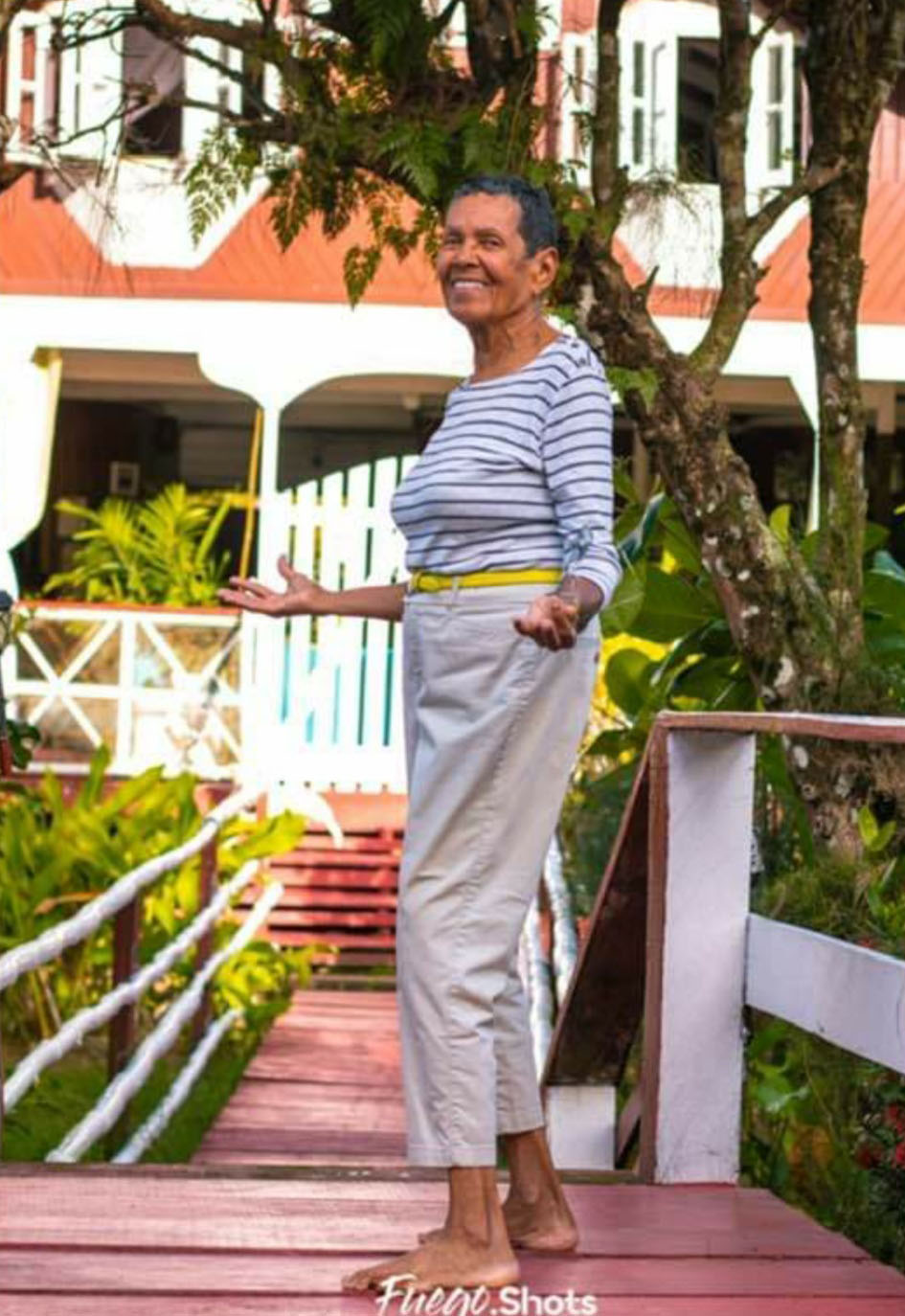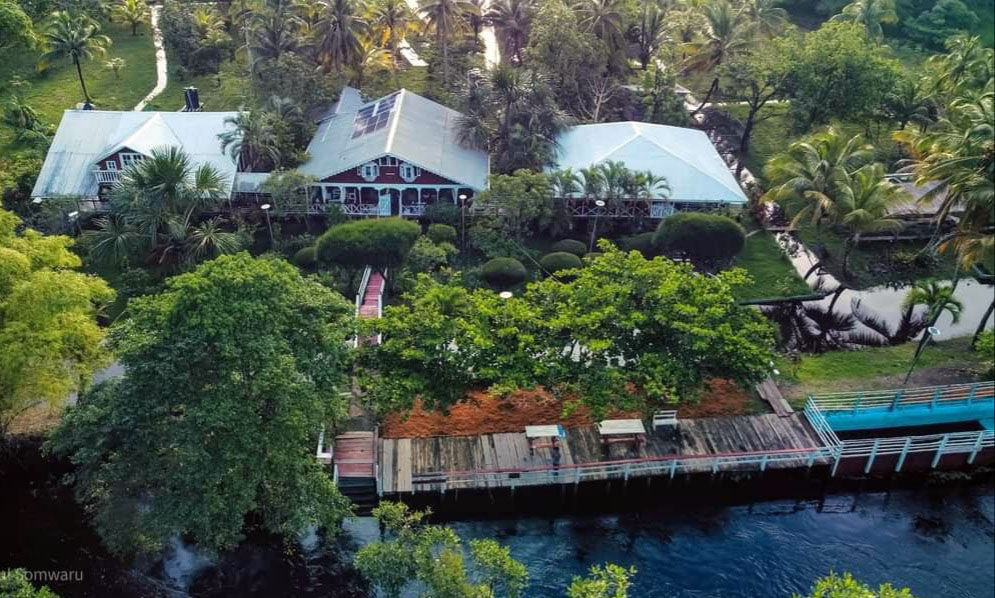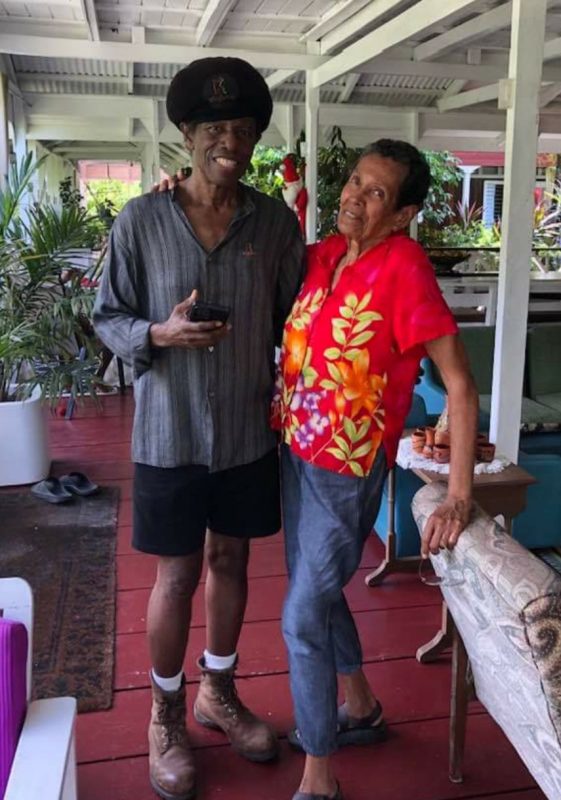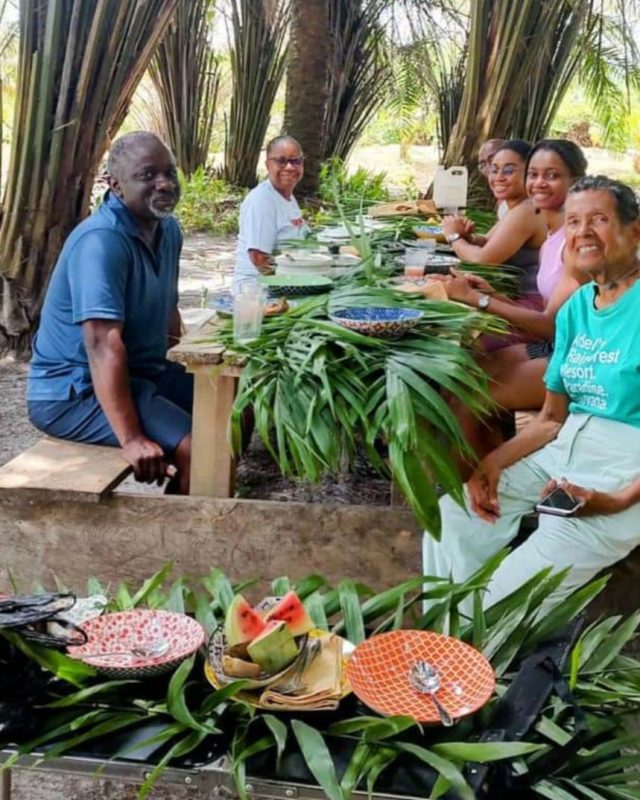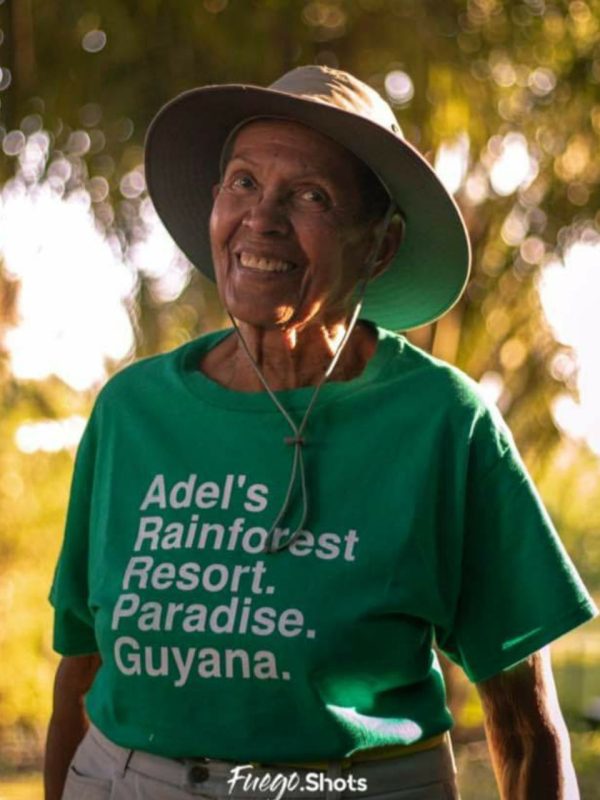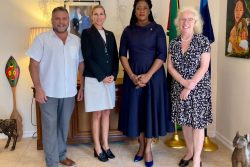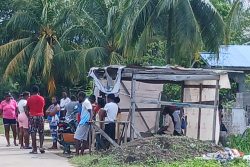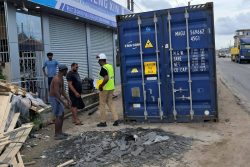Hotelier and tour operator Zena Stoll, who owns Adel’s Resort and Coconut Estate at the mouth of Akawini Creek and the Pomeroon River, unknown to many, has been a pioneer of eco-tourism in Guyana. She has been juggling her time between Washington DC in the US and Guyana to get the tourism project off the ground, realise her dream and at the same time stave off challenges that could have deterred her.
“When I’m not at Adel’s, I’m speaking to Barbara [Van Sluytman] who manages things for me. I am living here and there. It was tough at first trying to manage from overseas. People asked for advance and said they were doing this and that and when I checked, not much, or nothing was done. I got robbed many times. I shed tears, dried them, got up again. I rode the waves and now I can smile. I love every minute at Adel’s,” Stoll told Stabroek Weekend in an interview from her Washington DC home.
She came to Guyana in June and returned to the US a week ago. She will spend Christmas in DC and is scheduled to return to the Pomeroon during the first weekend in January 2025.
Born in the Pomeroon River to Ivy and Basil Stoll, she attended primary and secondary schools in Georgetown while her older sister was sent to the then Santa Rosa Roman Catholic School and lived at the convent run by the Sisters of Mercy.
“I went home to Pomeroon every holiday to the coconut estate that my parents owned and which my sister and I have today,” she related.
Stoll said she often visits Santa Rosa, a scenic place where much beauty and talent abound. She knows many people including passenger boat operator and businessman Clifford ‘Peanut’ Henry whose boat she charters whenever she takes visitors to Shell Beach in the Mabaruma sub-region. She also buys hammocks, baskets and other craft made by Warrau migrants from Venezuela through a middleman in Santa Rosa.
“As much as there is much to offer in terms of tourism at Santa Rosa, I don’t think the people there are looking at tourism. They could be a good supplier because they have the goods, they have the people but the lifestyle of living in Santa Rosa has certainly changed. People just want things off the shelf when they could be producers of so many things unique to the area and indigenous,” she said frankly.
On the other hand, Stoll, who has travelled the length and breadth of Guyana said she saw the opposite in the people of Santa Mission/ Aratak on the Kamuni Creek, West Demerara. “I think the people there are doing a wonderful job to earn a livelihood from the tourism products they craft or the services they provide,” she noted.
During the recent Amerindian Heritage Month, she visited Santa/Aratak and was impressed with the level of service the Indigenous People there provide.
“The first year the government started the Amerindian Heritage Month activities, I oversaw putting together the first programme. I took people and their work from six Indigenous nations to Europe and the Caribbean. Santa/Aratak and Kabakaburi came out on top. Kabakaburi really did some beautiful works with stained mucru (cane). That was my first experience of doing something of that nature. Amerindian Heritage Month has now become bigger than I ever anticipated,” she said.
Barbados
Stoll, the mother of four children, left Guyana for England at 19 years old. She subsequently got married and gave birth to three of her children there.
From England she moved to the US where she worked in the hospitality sector. There she saw her potential as an active participant in the tourism and hospitality industry. She took the opportunity to buy a 27-apartment property, Golden Sands Hotel in Christchurch, Barbados.
“I bought this hotel from the Merry-men, a group of Barbadian singers, who made their mark in the Caribbean, North America and Europe. Most of the band members lived in Canada,” she said.
Stoll felt she did “extremely well in Barbados” where she resided for 15 years during which time she gave birth to her fourth child.
During her time in Barbados, she was commissioned by the then BWIA to design and sell a programme called, ‘Know the hemisphere in which you live.’
The programme took her to all of the islands in the Caribbean where BWIA flew. At that time most of the people in this part of the world travelled to England or the US for their holidays. She said, “They never thought about going to other parts of the Caribbean. It’s like how Guyanese never thought about going to the Rupununi, Moruca, the Pomeroon on vacations. I felt it was a successful programme in the Caribbean. I didn’t do much of that programme in Guyana although we had BWIA here. Those were the days when Guyanese couldn’t take foreign currency out of the country,” she recalled.
Lungs of the world
She sold the property in Barbados after she inherited 60 acres of forest at Akawini from her grandmother, Adel, after whom she has named the place. “It was 60 acres of land left untouched by human hands for about 50 years.
“That’s the lungs of the world. Why would I not look at my lungs of the world and I was just sitting on a piece of rock in Barbados?” she asked rhetorically. She was in Barbados during the late 1970s and the early 1980s.
She started working on Adel’s in 1992.
“I knew that tourism worldwide was certainly going to go eco. It may not be in my lifetime, but I could prepare for it. So, I took the plunge. That’s how I came into tourism at Akawini. It took an enormous amount of time to develop. It took tears, it took joy, it took everything from me and today I love it. Today, I think of the joy I have,” she said. “I built on the good people.” These include the woman from Wakapoa, now in her 70s, who is responsible for keeping the buildings “squeaky clean.” Apart from housekeeping the woman in her spare time does crocheting.
“I pay her weekly, but she earns her extra as well through her crocheting [pieces] that are sold to guests and that has nothing to do with my business. She is very, very good at what she does,” she added.
Several weeks ago, Stoll said she ordered some wood from a man in the Akawini to repair a boat. After several calls and several weeks later, she is still awaiting the delivery of the wood. “Those are the little things that can put you off. Then when they come to buy my stuff worth $200,000, some might say they only have $100,000 and they will bring the other $100,000 tomorrow. Then you must wait and ask for the remainder. I cut that out. That’s the lifestyle of the area I live in,” she said.
Stoll, who was previously married to a Bone, reclaimed her maiden name, which is a popular name in the Pomeroon River.
“When people ask me my name and I say Zena Stoll, they ask, ‘Are you Basil Stoll’s daughter?’ Even in this day and age,” she said.
She has farmed, organically, about 30 acres of the 60-acre plot to which Adel’s is attached. Today she offers a blend of nature tourism, agricultural tourism and adventure tourism.
A peek of Adel’s offerings includes a tidal pool built into the creek, a nature trail, a palm grove and lots of birds.
“Even though I have been developing the place since 1992, I have not used the traditional media to advertise the place. It is strictly by word-of-mouth,” she stated.
More recently her guests put pictures of their visits to Adel’s on Facebook.
She has had guests from all over the world and locally, members of the diplomatic corps, senior public and private sector officials as well as church groups taking advantage of the offers. Cabinet has also had retreats at Adel’s.
“I think one of the reasons they come is because we also offer WiFi and people could easily communicate with the outside world,” she noted.
With the arrival of British Airways to Guyana, she has also been hosting visitors from England regularly.
A young senior
Describing herself as a young senior, she said, “I am young in body but really up in age.”
The fountain of knowledge on tourism said, “I say to people, I’d hate to die and take that knowledge with me.”
She accumulated her knowledge from working in the hospitality sector in the US and the tourism industry in Barbados and from travelling. She is widely travelled having visited 52 countries, some of them on multiple occasions.
“Barbados’s number one income earner is tourism. Their way of advertising is totally different from what we are trying to do in Guyana. I don’t know what is being done to bring in the volume of tourists to our country. We are not ready. We cannot just be putting up buildings after buildings and think that people will just walk in. That is not tourism,” she noted.
Two Fridays ago, she said, she was lunching at a popular cafe in the city and shared a table with the wife of an ExxonMobil official who spoke of her experience thus far in Guyana.
“She was already here for two weeks, into her third week. They are staying at a (franchised) hotel that recently opened. They are paying US$550 a night for a room with no breakfast. The room had just the basics. The wife said there wasn’t this and there wasn’t that, including a table or desk on which to place a laptop to get some work done,” she related.
Stoll opined that because they had only recently opened, perhaps, the hotel’s management had not gone through all the nitty gritty but then they should not be charging that kind of price.
“I advised her to write a note and tell them, these are the items she found missing and certainly US$550 was way too much for what was not available,” she said.
“I don’t know. You just cannot employ mommy because she knows to cook curry and roti or employ so and so because she makes the best bakes ever. These people must be trained in providing a service.
“I’m not boasting but I train my staff how to do this and that. They are pretty good. When I am away, I don’t know what they do but I only hope they follow my training. However, when I recently got a call from an overseas visitor who said, ‘What a wonderful place you have’, I said, ‘goodness, gracious me, I believe they were treated nicely’”.
Adel’s rate is US$100 a night, all inclusive. Guests get three meals a day and accommodation. “I think I probably have the cheapest rate for what I offer and you’re eating organic,” she said.
Corporate social responsibility
The build up of garbage at popular tourism destinations, she noted, was appalling.
“Some of the places at Charity. I don’t even know how people stay there, just to walk through garbage to get to the stairs,” she said.
Curbside view is most important, she said. “If I see garbage on the outside, why am I going in? Curbside is your entrance, and it must be clean. You must clean everyday,” she stressed.
Two years ago, she spent three weeks in Amritsar, India where the Golden Temple (Gurdwara is found. “The area is poor but it’s very clean. We stayed at the Ritz Carlton Hotel. As part of their corporate social responsibility, Ritz pays residents so many rupees to keep the area clean. They also pay for security. That was marvellous because you are free to walk at night. Nobody bothers you,” she said.
She noted that this could be emulated by businesses locally.
Here, she said, she stayed at the Marriott Hotel in Georgetown in an executive suite on the third floor where there is private dining, for two nights in August last year.
“I walked into the dining room and this woman comes out. She sees me and says, ‘Good to see you again. You’re back. Welcome.’ I said to myself, ‘This is wonderful. I felt welcomed’,” she related.
She looked for the manager, a Brazilian, and told him of her experience and he welcomed the feedback. The manager told her that the hotel holds regular meetings with the staff on how to meet and greet visitors and conducts a lot of in-house training and retraining.
In-house training and retraining, she said, is needed at individual guest houses, hotels and resorts. “Not just at one location in Anna Regina. What about Charity? What about the Pomeroon?”
